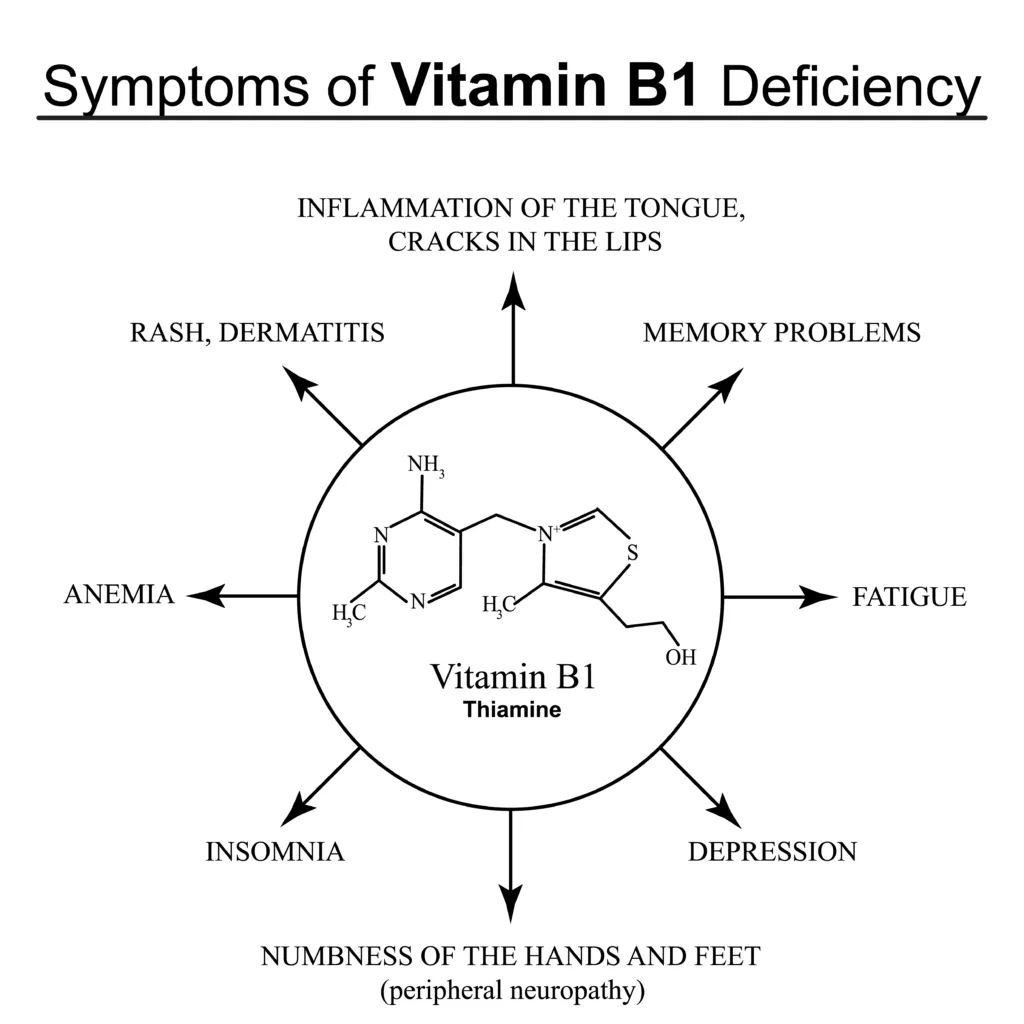What is Beriberi?
Beriberi is a serious nutritional disorder caused by a deficiency of vitamin B1 (thiamine), which was the first vitamin to be identified. Thiamine is crucial for energy production, functioning as a coenzyme in carbohydrate metabolism and glucose formation. It plays a key role in the decarboxylation of branched-chain amino acids and alpha-ketoacids and acts as a coenzyme for transketolase reactions in the form of thiamine pyrophosphate. Additionally, thiamine is essential for nerve function, contributing to nerve impulse propagation and maintenance of the myelin sheath. A deficiency in this water-soluble vitamin can lead to severe impacts on the cardiovascular, nervous, and immune systems. 1Thiamine. Monograph. Altern Med Rev. 2003 Feb;8(1):59-62.
Thiamine is naturally found in meat, beef, pork, legumes, whole grains, and nuts. However, milled rice and grains have significantly reduced thiamine content due to the processing methods that strip away nutrients. Certain foods, such as tea, coffee, raw fish, and shellfish, contain thiaminases—enzymes that degrade thiamine, further contributing to deficiency risks.2Bettendorff L. Thiamin. In: Erdman JW, Macdonald IA, Zeisel SH, eds. Present Knowledge in Nutrition. 10th ed. Washington, DC: Wiley-Blackwell; 2012:261-79. Beriberi is most commonly reported in populations that rely heavily on polished rice and milled cereals as dietary staples and in individuals with chronic alcohol use disorder, which impairs thiamine absorption.
Symptoms of Beriberi
BeriBeri mainly affects your cardiovascular and nervous systems, and there are the following symptoms of it:
Neurological Symptoms:
Tingling, numbness, difficulty speaking, impaired muscle function, difficulty walking, and paraplegia (loss of lower limb function). Advanced cases may present with visual problems, nystagmus (uncoordinated eye movements), and memory issues, including confusion and confabulation.
Cardiovascular Symptoms:
Shortness of breath, tachycardia (rapid heartbeat), swelling in the hands or feet, chest pain, and signs of high-output heart failure, such as peripheral edema and dilated cardiomyopathy.3DiNicolantonio JJ, Liu J, O’Keefe JH. Thiamine and Cardiovascular Disease: A Literature Review. Prog Cardiovasc Dis. 2018 May-Jun;61(1):27-32.
Additional Signs:
Fatigue, vomiting, and difficulty maintaining balance (ataxia).
Severe thiamine deficiency can also progress to Wernicke’s encephalopathy, characterized by a triad of confusion, ataxia, and ocular abnormalities, or Wernicke-Korsakoff syndrome, which includes severe memory impairment and psychosis.

Types
There are two types of it:
Wet BeriBeri:
Wet BeriBeri affects the cardiovascular system. Symptoms include tachycardia, irregular heart rate, and shortness of breath. If the case is severe, heart failure can occur.
Dry BeriBeri:
Dry BeriBeri is a demyelinating neuropathy that mainly affects your nerves. Its symptoms include numbness, loss of sensations, tingling, confusion, difficulty in moving limbs, loss of function of lower limbs, and pain.

Why does the deficiency of Thiamine cause BeriBeri?
Thiamine (Vitamin B1) is involved in carbohydrate metabolism, and its product, thiamine pyrophosphate, acts as a coenzyme in the citric acid cycle and glucose formation. The citric acid cycle is a key regulator of carbohydrates, lipids, and protein metabolism, so thiamine deficiency causes severe metabolic effects. A deficiency of thiamine affects the citric acid cycle; as a result, many essential molecules, including glutamic acid and Gamma amino butyric acid (GABA), can not be produced. Glutamic acid and Gamma amino butyric acid are crucial neurotransmitters in your body, and because of the decreased production of these neurotransmitters, symptoms like numbness, tingling, loss of lower limb function, and muscle paralysis occur.
Causes of Beriberi
The causes include4Attaluri P, Castillo A, Edriss H, Nugent K. Thiamine Deficiency: An Important Consideration in Critically Ill Patients. Am J Med Sci. 2018 Oct;356(4):382-390.
Dietary causes:
It occurs due to foods that are deficient in thiamine. These foods include polished rice, cassava roots, and animal and plant products. Moreover, Infants fed formula milk instead of breast milk also have an increased risk of developing BeriBeri because formula milk doesn’t contain enough thiamine. As a result, thiamine deficiency occurs, causing BeriBeri.
Diseases that increase the risk of BeriBeri:
People with cancer, AIDS, hypothyroidism, and diabetes are at greater risk of developing BeriBeri. In addition to these, it also occurs in chronic gestational tract disorders like diarrhea and inflammatory bowel disease because an excessive amount of thiamine is excreted from your body. As a result, your body lacks enough thiamine, and BeriBeri occurs.
Dialysis and Diuretic Drugs:
BeriBeri also occurs in patients using diuretic drugs for a long time or in dialysis cases.
Alcoholism:
Chronic consumption of alcohol causes BeriBeri because alcohol impairs the absorption of thiamine. As a result, your body lacks enough thiamine, and neurological symptoms occur.5Dhaliwal A, Larson JL, Dhindsa BS, Bhogal N, Rochling FA. Dry Beriberi Manifesting as Acute Inflammatory Demyelinating Polyneuropathy in a Patient With Decompensated Alcohol-Induced Cirrhosis. Cureus. 2020 Oct 31;12(10):e11281. doi: 10.7759/cureus.11281. PMID: 33274156; PMCID: PMC7707918.
Infantile BeriBeri:
Infantile Beriberi is a condition that affects infants due to a deficiency of thiamine (vitamin B1). It can also result from inadequate thiamine intake by breastfeeding mothers, leading to low thiamine levels in breast milk. Consequently, infants who rely solely on breast milk may develop thiamine deficiency. Symptoms of infantile Beriberi include loss of appetite, gastrointestinal issues, weakness, irritability, edema, anxiety, and a lean or wasted appearance.
If left untreated, this condition can be severe and life-threatening. Research has shown that infantile Beriberi is a significant cause of infant mortality in regions like northern Laos, where thiamine deficiency is prevalent.6Barennes, H., Sengkhamyong, K., René, J. P., & Phimmasane, M. (2015). Beriberi (thiamine deficiency) and high infant mortality in northern Laos. PLoS Neglected Tropical Diseases, 9(3), e0003581. https://doi.org/10.1371/journal.pntd.0003581
Why does Alcoholism cause BeriBeri?
Chronic alcohol consumption can lead to Beriberi because alcohol impairs the absorption and utilization of thiamine (vitamin B1) in the body. Over time, this can deplete the body’s stores of thiamine, resulting in a deficiency. Thiamine deficiency primarily affects the nervous system, potentially leading to severe conditions like Wernicke’s Korsakoff Syndrome (WKS).7Martin, P. R. (2003). The Role of Thiamine Deficiency in Alcoholic Brain Disease. PubMed Central (PMC). https://www.ncbi.nlm.nih.gov/pmc/articles/PMC6668887/
BeriBeri vs. Wernicke’s Korsakoff Syndrome
BeriBeri is a common disease caused by thiamine deficiency that affects the nervous and cardiovascular systems. However, Wernicke’s Korsakoff Syndrome (WKS) is a severe neurological disorder and a form of dry beriberi, characterized by a combination of Wernicke’s encephalopathy and Korsakoff psychosis. Symptoms of WKS include confusion, unsteady gait, balance issues, hypothermia, drowsiness, confabulation (fabricated memories), double vision (diplopia), drooping eyelids (ptosis), and muscle paralysis around the eyes (ophthalmoplegia).8Kril JJ. Neuropathology of thiamine deficiency disorders. Metab Brain Dis. 1996 Mar;11(1):9-17. doi: 10.1007/BF02080928. PMID: 8815394.
How can Beriberi be prevented?
The primary prevention of Beriberi involves ensuring adequate thiamine intake through a balanced diet. Foods rich in thiamine, such as beans, pork, fish, whole grains, and fortified cereals, can help prevent the deficiency. Additionally, consuming thiamine-fortified foods, such as certain breakfast cereals and enriched rice, can further support prevention, especially in populations at higher risk.
In the early stages of thiamine deficiency, dietary changes alone may help alleviate symptoms. However, in more advanced stages of Beriberi, particularly if neurological or cardiovascular symptoms have developed, oral thiamine supplements or intravenous thiamine infusions are often required to reverse the deficiency and prevent further damage.
How much Thiamine is needed for our body daily?
The recommended daily allowance (RDA) of thiamine is 1.2mg for men and 1.1 mg for women, serving as a guideline for the adequate intake necessary to support bodily functions.9nstitute of Medicine (US) Standing Committee on the Scientific Evaluation of Dietary Reference Intakes and its Panel on Folate, Other B Vitamins, and Choline. Dietary Reference Intakes for Thiamin, Riboflavin, Niacin, Vitamin B6, Folate, Vitamin B12, Pantothenic Acid, Biotin, and Choline. Washington (DC): National Academies Press (US); 1998. 4, Thiamin. Available from: https://www.ncbi.nlm.nih.gov/books/NBK114331/ By ensuring that your diet includes thiamine-rich foods that meet or exceed the recommended daily allowance, you meet immediate thiamine needs and allow your liver to store a reserve of this vital nutrient. The storage of thiamine in the liver serves as a protective measure, acting as a buffer against the risk of thiamine deficiency and its associated conditions.
How is Beriberi Diagnosed?
The diagnosis of BeriBeri is mainly symptomatic. A detailed medical history, including dietary habits, alcohol consumption, and any relevant risk factors, is essential for diagnosis. A neurological examination is crucial for identifying signs of nerve damage or neurological involvement.
Further diagnostic tests may include:
- Blood tests to assess thiamine levels and rule out other deficiencies.
- Urine tests should be performed to check for low thiamine excretion, as thiamine deficiency may lead to reduced thiamine levels in the urine.
- Electrocardiography (ECG) to detect potential cardiovascular abnormalities, such as arrhythmias, which are common in wet Beriberi.
- Neurological imaging or assessment should be performed to rule out other causes of neurological symptoms, especially in cases of Wernicke’s encephalopathy or Korsakoff syndrome.
Management for Beriberi
The first step in the treatment of BeriBeri is a dietary modification, which includes adding foods that contain enough thiamine in your diet so you can add foods like beans, pork, fish, yogurt, cereals, and thiamine-rich fortified foods. As a result, your body contains enough thiamine to meet daily needs.
For severe cases of Beriberi, especially when neurological or cardiovascular symptoms are present, thiamine supplements or intravenous thiamine infusions are administered to restore thiamine levels quickly. For acute thiamine deficiency presenting with cardiovascular or neurological symptoms, 200mg of thiamine (intravenous or oral) should be administered three times daily until symptoms improve. Once improvement plateaus, transition to 10mg/day of oral thiamine for continued recovery. Alternatively, 50mg of intramuscular thiamine can be given for 2-4 days, followed by oral maintenance therapy.10Wiley KD, Gupta M. Vitamin B1 (Thiamine) Deficiency. [Updated 2023 Jul 17]. In: StatPearls [Internet]. Treasure Island (FL): StatPearls Publishing; 2024 Jan-. Available from: https://www.ncbi.nlm.nih.gov/books/NBK537204/
In the case of infantile Beriberi, breastfeeding mothers should include thiamine-rich foods and consider thiamine supplements to prevent or treat the deficiency in both the mother and the infant.
Treatment of Thiamine Deficiency with Suspected Wernicke-Korsakoff Syndrome (WKS):
For suspected Wernicke-Korsakoff Syndrome (WKS), the treatment involves:
- 500mg IV thiamine infused over 30 minutes, administered three times daily for the first two days.
- On days 3-5, reduce the dose to 250mg IV or intramuscular thiamine daily.
- Thiamine should always be given during re-feeding in patients with alcoholism to prevent further complications such as lactic acidosis.11Osiezagha K, Ali S, Freeman C, Barker NC, Jabeen S, Maitra S, Olagbemiro Y, Richie W, Bailey RK. Thiamine deficiency and delirium. Innov Clin Neurosci. 2013 Apr;10(4):26-32.
Recovery Timeline:
- Symptoms of Wernicke-Korsakoff syndrome may persist for months and could potentially be permanent.
- Other symptoms of thiamine deficiency, like anorexia and irritability, are expected to improve gradually with treatment.
What are the Consequences of BeriBeri if Left Untreated?
If you don’t treat it initially by supplementation with thiamine, it leads to severe consequences like heart failure, encephalopathy, brain damage, muscle paralysis, heart failure, and even death because of severe metabolic derangements that severely affect your nervous systems and cardiovascular system.
Conclusion
Beriberi is a nutritional disorder that occurs due to a deficiency of thiamine (Vitamin B1), and affects your cardiovascular and nervous systems badly. It is common in people who are malnourished, diabetics, use diuretics, polished rice, or consume alcohol excessively. You can use Thiamine-rich foods like fish, beans, pork, yogurt, and thiamine-fortified foods to treat the early stages of the disease. However, for advanced stages of the disease, treatment includes oral and intravenous infusions of thiamine. To prevent this disease, you should consume a balanced diet containing enough thiamine to meet daily needs.
Refrences
- 1Thiamine. Monograph. Altern Med Rev. 2003 Feb;8(1):59-62.
- 2Bettendorff L. Thiamin. In: Erdman JW, Macdonald IA, Zeisel SH, eds. Present Knowledge in Nutrition. 10th ed. Washington, DC: Wiley-Blackwell; 2012:261-79.
- 3DiNicolantonio JJ, Liu J, O’Keefe JH. Thiamine and Cardiovascular Disease: A Literature Review. Prog Cardiovasc Dis. 2018 May-Jun;61(1):27-32.
- 4Attaluri P, Castillo A, Edriss H, Nugent K. Thiamine Deficiency: An Important Consideration in Critically Ill Patients. Am J Med Sci. 2018 Oct;356(4):382-390.
- 5Dhaliwal A, Larson JL, Dhindsa BS, Bhogal N, Rochling FA. Dry Beriberi Manifesting as Acute Inflammatory Demyelinating Polyneuropathy in a Patient With Decompensated Alcohol-Induced Cirrhosis. Cureus. 2020 Oct 31;12(10):e11281. doi: 10.7759/cureus.11281. PMID: 33274156; PMCID: PMC7707918.
- 6Barennes, H., Sengkhamyong, K., René, J. P., & Phimmasane, M. (2015). Beriberi (thiamine deficiency) and high infant mortality in northern Laos. PLoS Neglected Tropical Diseases, 9(3), e0003581. https://doi.org/10.1371/journal.pntd.0003581
- 7Martin, P. R. (2003). The Role of Thiamine Deficiency in Alcoholic Brain Disease. PubMed Central (PMC). https://www.ncbi.nlm.nih.gov/pmc/articles/PMC6668887/
- 8Kril JJ. Neuropathology of thiamine deficiency disorders. Metab Brain Dis. 1996 Mar;11(1):9-17. doi: 10.1007/BF02080928. PMID: 8815394.
- 9nstitute of Medicine (US) Standing Committee on the Scientific Evaluation of Dietary Reference Intakes and its Panel on Folate, Other B Vitamins, and Choline. Dietary Reference Intakes for Thiamin, Riboflavin, Niacin, Vitamin B6, Folate, Vitamin B12, Pantothenic Acid, Biotin, and Choline. Washington (DC): National Academies Press (US); 1998. 4, Thiamin. Available from: https://www.ncbi.nlm.nih.gov/books/NBK114331/
- 10Wiley KD, Gupta M. Vitamin B1 (Thiamine) Deficiency. [Updated 2023 Jul 17]. In: StatPearls [Internet]. Treasure Island (FL): StatPearls Publishing; 2024 Jan-. Available from: https://www.ncbi.nlm.nih.gov/books/NBK537204/
- 11Osiezagha K, Ali S, Freeman C, Barker NC, Jabeen S, Maitra S, Olagbemiro Y, Richie W, Bailey RK. Thiamine deficiency and delirium. Innov Clin Neurosci. 2013 Apr;10(4):26-32.

